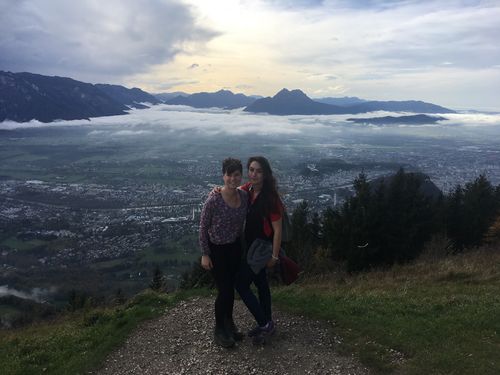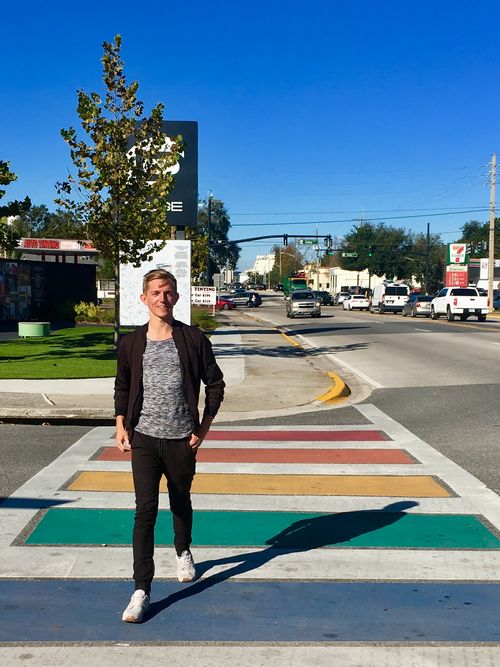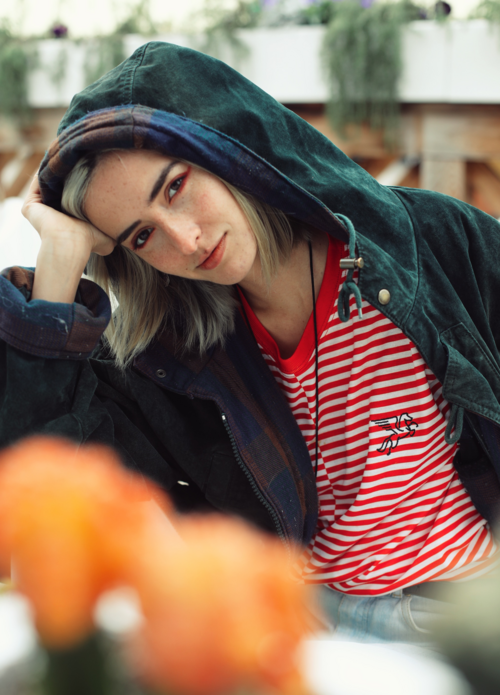Starting in the early morning hours of June 28, 1969, members of the LGBT community took part in a series of demonstrations that have become known as the Stonewall riots. 50 years later, the Stonewall riots are considered to be a defining moment along the path toward securing LGBT rights in the US. To mark the 50th anniversary of the Stonewall riots, we asked one Austrian and two American program participants to share their experiences as members of the communities in their respective host country.
50-Year Anniversary of the Stonewall Riots
1 April 2019To mark the 50th anniversary of the Stonewall riots, we asked one Austrian and two American program participants to share their experiences as members of the communities in their respective host country.
My Experience in the LGBTQIA+ Community in Austria
By Mary Kirchdorfer
I come from a supportive family in Minneapolis, Minnesota, an extremely liberal city with a thriving LGBTQIA+ community. Moving to Salzburg as a USTA was a pretty big adjustment in many cultural ways, especially because it’s a much more conservative city in terms of queer representation, resources, and gender roles. While my experience as a bisexual woman in both cities has been positive, there are some striking differences.
I attended Augsburg University for my undergraduate degree and the University of Minnesota for my master’s degree. Both of these schools had a queer straight alliance/women-trans-femme-type group where I was able to meet the majority of my friends. Minneapolis often has queer dance nights in clubs and bars, and 90 percent of my close friends are queer. When I moved to Salzburg, I realized how much I took this for granted.
Without a university, it was hard to find group settings not only for dating but just for making other queer friends. Minneapolis also has far more gay/lesbian bars. While Salzburg does have a few gay bars, there are no bars for women to meet women. This isn’t surprising since Salzburg is a much smaller and more traditional city. For the first time in my life, I used apps like Tinder and HER, and this is where I was able to finally meet queer friends/partners. In general, my group involvement with the queer community in Salzburg has been minimal, but I have met a few wonderful people with the help of those apps.
I was so excited to move to Salzburg and I do love it here, but as with any new space, I was nervous to have to come out all over again. In many ways, I was right to be nervous. For the first time in my life, I met homophobic students. In one of my schools, I taught a few lessons on gay rights and homeless gay youth, and I had students tell me they do not support gay rights. This was difficult (obviously), but I am always perceived as a straight woman, so it was not obvious to the students. In the same class, I had students defending LGBT rights, and it led to a more lively discussion in English, which, in the end, is the main goal. While I am not as open about being queer at work in Salzburg, I still feel safe working here and supported by my colleagues.
While in Minneapolis I had a sense of comfort being out at my workplace and an easier time finding the queer community, the people (queer or not) that I have met here in Salzburg have been incredibly welcoming and kind. I am starting to feel like Salzburg is a second home, especially with my best friend Paula. Moving to Salzburg has taught me how to rebuild my circle from scratch and find the support I need in a new country. It has also taught me a lot about being independent in my own queer identity, and I am forever grateful. It is also the most beautiful place I have had the privilege of experiencing!
 USTA Mary Kirchdorfer (left)
USTA Mary Kirchdorfer (left)Queerness in Higher Education
By Benjamin Fischer
The LGBTQIA+ community's struggle for equal rights has been a long and demanding one, and it is far from over. Institutions of higher education and their students have historically been very influential in improving our community’s situation. Before moving to the USA, specifically to a small, private, liberal-arts college campus in a conservative town in the Midwest, I was anxious to find out how LGBTQIA+ matters would be handled here. I was not expecting much understanding, let alone acceptance, but was pleasantly surprised. The College of Wooster has a Center of Diversity & Inclusion that specifically deals with any sort of discrimination and organizes events raising awareness to minority-related issues. Mental and physical health is given the same importance in the on-campus Wellness Center. Students are actively encouraged to indicate the gender, pronouns, and name they identify with and are addressed accordingly. The College of Wooster and its student-run organizations even arrange a Pride Week as well as year-round socializing events for the queer community. With regard to dealing with matters of diversity, this campus feels like an ideal world, and while I have genuinely enjoyed that, I know that it also constitutes a kind of bubble and that the situation outside of it is radically different.
While the civil-rights movement originated in the United States and later spread to Europe and the rest of the world, that does not necessarily mean that the US is more progressive in handling inequality and discrimination. Given that it is a country with a centuries-old bipartisan tradition, a lot depends on which party is currently in power. That is not only true for policy matters; it also influences societal stances towards controversial topics as well, since politics have a considerable influence on public opinion.
My personal impression is that although all universities and colleges I have attended and visited in Austria and the United States tend to be more liberal than the general population, show sympathy towards LGBTQIA+ community members’ concerns, and take measures to make their everyday life more comfortable, US schools more actively make minority issues a subject of discussion and have a strictly enforced “zero tolerance” policy towards discrimination as well as free-of-charge professional counseling sessions. Even if it’s limited to the college grounds, the campus population’s ability to unconditionally be ourselves has been incredibly empowering and has given me hope for society as a whole to finally stop stigmatizing diversity and start embracing it as what it really is: a massive chance for a society to develop and thrive.
 FLTA Benjamin Fischer
FLTA Benjamin FischerTexas-Toned Trepidation
By Grace Guthrie
In the canon of American stereotypes, Texas holds a particularly special place. When doing a lesson about American stereotypes, I had the spontaneous idea to ask my students about their preconceived notions about Texas in particular; and man, did their eyes light up. “What’s the rope… that they swing over their head?” “A lasso!” I replied, punctuated with a quick whip of my wrist above my head and a “yeehaw!” The students laughed, and more hands went up. They asked if there actually were deserts everywhere, if there actually were cowboys, and yes, whether or not everyone had a gun. I answered their questions candidly and watched eyebrows raise as I reminded them that I come from a metropolitan area of roughly 7 million people, their heads nodding as I addressed the political tension present in my state. While some of my students’ ideas about Texas were not too grounded in reality (i.e. “it’s all desert”), some of them were informed by difficult-to-talk-about facts and cultural realities that have shaped how I navigate and perceive the world.
Texas has a reputation for being socially conservative. And while my parents have always been tolerant, I grew up in a social setting where “not straight” meant “not appropriate.” I have many anecdotes from my school times where that was made clear to me: like when we showed a video on our high school newscast that implored queer youth to not self-harm or commit suicide and received angry calls from parents afterwards saying that we were “promoting the gay agenda.” We had to pre-record and clear our newscasts with administration thereafter.
The homophobic norm of my high school didn’t affect me as it would many queer teens. As I hadn’t accepted or begun to explore my bisexuality in high school, I was able to “pass” as straight not only to others, but also to myself. However, I find my high school experience affecting me more after the fact as a teacher. Now that I’m on the other side of the classroom, the homophobia I encountered in high school has come back to retroactively haunt me, coloring my experience as a bisexual teacher with Texas-toned trepidation.
While planning lessons I find myself wondering “is this okay to say in class? Can I talk about marriage equality? Can I do a lesson on Stonewall and the history of the gay-rights movement?” Throughout my school years in Texas, the resounding consensus was that even bringing up the existence of queer people in a classroom was “inappropriate” at best, and “propagation of the gay agenda” at worst. I have seen that that isn’t the case here in Innsbruck—a school book in one of my classes even used a photo of a two-mother family for a photo description exercise. My students and fellow teachers are, to the extent of my knowledge, quite tolerant; yet thus far, I haven’t done any lessons that are explicitly centered around queer topics. Any time I’ve even referenced queer topics, my heart starts pounding; I fear that talking about these topics will be met with controversy and confrontation. It never is.
 USTA Grace Guthrie
USTA Grace Guthrie